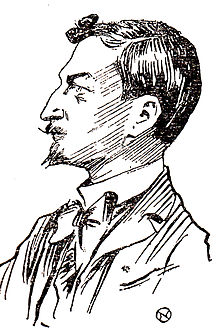Ștefan Petică
| Ștefan Petică | |
|---|---|

Petică, as sketched by Nicolae Petrescu-Găină
|
|
| Born |
January 20, 1877 Buceștim Galați County |
| Died | October 17, 1904 (aged 27) Bucești |
| Pen name | Caton, Erics, Mușat, Narcis, Sapho, Senez, Sentino, Sergiu, Step, Stiopca, Ștefan, Trubadur, Șt. P. |
| Occupation | poet, playwright, literary theorist, journalist |
| Nationality | Romanian |
| Period | 1894–1903 |
| Genre | poetry, drama |
| Literary movement | Symbolism |
Ștefan Petică (January 20, 1877–October 17, 1904) was a Romanian Symbolist poet, prose writer, playwright, journalist and socialist activist. Born in the countryside of Tecuci, he early displayed a voracious appetite for literature and philosophy. After high school, he made his way to the national capital Bucharest, where university studies soon gave way to low-paid newspaper work. Petică published one volume of poetry before his premature death, and left his mark as one of the first exponents of the domestic Symbolist movement.
Born in Bucești, Galați County, his parents were the free peasants (răzeși) Ianache and Catinca Petică. He attended primary school in nearby Liești, followed by the D. A. Sturdza gymnasium in Tecuci (1888-1892) and the Nicolae Bălcescu High School in Brăila (1892-1896). Petică obtained his high school degree in Bucharest in 1898. He enrolled at the University of Bucharest's literature and philosophy faculty, but did not graduate due to a lack of funds that led him to become a prolific but poorly paid journalist. Although he was a good science student in high school, he was more interested in literature, gaining fluency in French, German and English and keeping current with contemporary European writers. His reading of foreign authors was done in the original language, the three aforementioned as well as Spanish and Italian; he also acquired some knowledge of Russian. He was also interested in philosophy and sociology, which he read widely and with care. He and a classmate reportedly preferred a study of Herbert Spencer to lunch, and a poem by Walt Whitman to supper.
In spite of his perpetual poverty, Petică's omnivorous intellect led him to Greek and Roman classics, a commentary on the Quran, verses by Ferdowsi in German, Copernican astronomy, Spanish romances, Franc Miklošič's study of Romanian philology, Johann Wolfgang von Goethe's aesthetics; works by Wilhelm Wundt, Arthur Schopenhauer, Arthur de Gobineau and Spencer's First Principles; the archaeological findings of Johann Joachim Winckelmann and Stefan George's magazine Blätter für die Kunst. Others who entered his radius include Théodore Aubanel, Frédéric Mistral, Stendhal, Ernest Renan, Ugo Foscolo, Fyodor Dostoyevsky, Ivan Turgenev, Leo Tolstoy and Alexander Herzen. His critical references from 1900 to 1903 show that he not only knew Charles Baudelaire, Stéphane Mallarmé, Paul Verlaine, Jean Moréas, Albert Samain, Emile Verhaeren and Maurice Maeterlinck, but was also serious about art history. His commentary used studies of Greek art by Winckelmann and Gotthold Ephraim Lessing, as well as aesthetic arguments by John Ruskin.
...
Wikipedia
